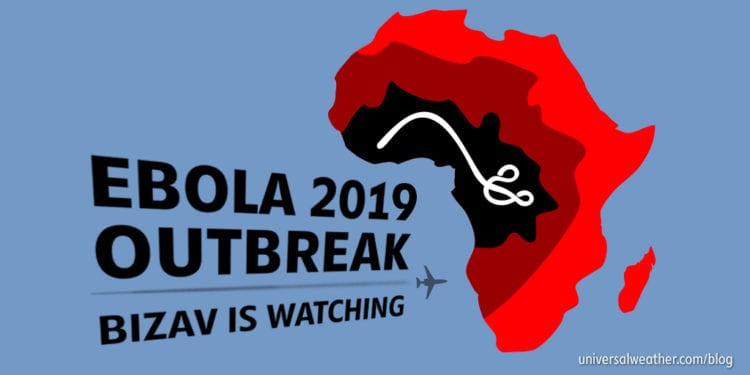Ebola outbreak in Central Africa – Business aviation is watching.

UPDATE: The World Health Organization recently declared the Ebola virus disease (EVD) outbreak in the Democratic Republic of the Congo (DRC) a Public Health Emergency of International Concern (PHEIC).
An outbreak of Ebola in Central Africa that was first reported in August 2018 has continued to make headlines. As of the date of publication of this article, we are unaware of any restrictions on business aviation. However, due to the fluidity of the situation and impact that the 2014-2016 West Africa Ebola epidemic created for business aviation, it is recommended that operators traveling to or from Central Africa, or carrying passengers originating from Central Africa, monitor their country’s local health department and other global health agencies for the latest information.
The most current Ebola outbreak
In early August 2018, the World Health Organization (WHO) was notified by the Ministry of Health of the Democratic Republic of the Congo of new cases of Ebola. Since that time, the WHO has reported “that nine neighboring countries have been advised that they are at high risk of spread and have been supported with equipment and personnel. Particular emphasis has been placed on Uganda, Rwanda, Burundi, and South Sudan in terms of preparedness activities.“
Current outbreak not an international public health emergency at this time
At an emergency WHO committee meeting, Oct. 17, 2018, it was determined that the current outbreak does not yet meet the criteria for a Public Health Emergency of International Concern at this time. However, the committee also reported that it remains highly concerned and are monitoring the situation closely. Many of the reported cases are currently within conflict zones making it difficult for healthcare workers to safely access the impacted population. Local distrust of medical services is also complicating reporting, making it more challenging to gauge just how many people have been infected. Concern remains that due to moving populations, due to warzones, containment will be difficult and could lead to more cases across borders.
No impact to business aviation yet, but operators travelling to/from Central Africa or carrying passenger from this region should be prepared
At this time, there are no current restrictions for operators traveling to Central Africa. However, before traveling to this region, operators should thoroughly review their local and international health agency websites for the latest advisories and any breaking travel restrictions. During the 2014-16 outbreak, various countries imposed restrictions on business aircraft originating from impacted countries or carrying passengers originating from them.
What kind of travel restrictions could be put in place if the outbreak worsens?
In previous Ebola outbreaks, restrictions included denial of landing, temporary visa requirements, questionnaires that need to be completed, and health checks for those who have traveled to any of the affected countries.
What is recommended to all operators for international travel?
Always check with your trip support provider and ground handler to determine the latest regulations pertaining to any restrictions due to Ebola, as these may be placed or changed within a moment’s notice.
Always visit your country’s local health department to gain more information regarding this epidemic.
Where can I go for more information?
Visit your country’s local health department. Other resources to check include:
- World Health Organization: http://www.who.int
- Centers for Disease Control: http://www.cdc.gov
- Federal Aviation Administration: http://www.faa.gov/
- EuroControl: http://www.eurocontrol.int/
- UK Department of Health: https://www.gov.uk/government/organisations/department-of-health
- Public Health Europe: http://ec.europa.eu/health/
- Pan American Health Organization: http://www.paho.org/hq
- WHO Africa: http://www.afro.who.int/
- WHO Southeast Asia: http://www.searo.who.int/en/
- WHO Europe: http://www.euro.who.int/en/home
- WHO Eastern Mediterranean: http://www.emro.who.int/index.html
- WHO Western Pacific: http://www.wpro.who.int/en/
The advice provided in this communication related to the Ebola outbreak is intended for informational purposes only. Additional guidance should be sought from the sources referenced above if you have additional questions or concerns.




